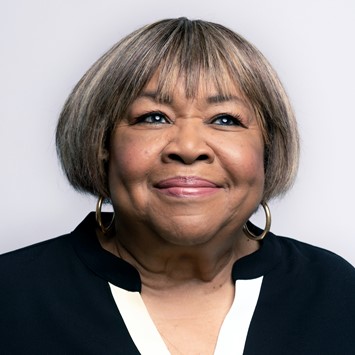“I’m the messenger,” Mavis Staples declares. “That’s my job — it has been for my whole life — and I can’t just give up while the struggle’s still alive. We’ve got more work to do, so I’m going to keep on getting stronger and keep on delivering my message every single day.”
That message — a clarion call to love, to faith, to justice, to brotherhood, to joy — lies at the heart of “We Get By” (2019), Staples’ first full-length collaboration with multi-Grammy Award winner Ben Harper. Backed by her longtime touring band, Staples animates Harper’s compositions, delivering roof-raising performances with both a youthful vigor and a commanding maturity. Like everything Staples touches, it’s also larger than any particular moment, a timeless appeal to the better angels of our nature that’s universal in its reach and unwavering in its assurance of better things to come.
Hailed by NPR as “one of America’s defining voices of freedom and peace,” Staples is the kind of once-in-a-generation artist whose impact on music and culture would be difficult to overstate. She’s both a Blues and a Rock and Roll Hall of Famer, a civil rights icon, a three-time Grammy Award winner, a chart-topping soul/gospel/R&B pioneer, a National Arts Awards Lifetime Achievement recipient and a Kennedy Center honoree. She marched with the Rev. Martin Luther King Jr., performed at John F. Kennedy’s inauguration and sang in Barack Obama’s White House. She has collaborated with everyone from Prince and Bob Dylan to Arcade Fire and Hozier, blown away countless festivalgoers from Newport Folk and Glastonbury to Lollapalooza and Bonnaroo, performed with The Band at “The Last Waltz” and graced the airwaves on Fallon, Colbert, Ellen, “Austin City Limits,” the Grammy Awards and more.
At a time when most artists begin to wind down, Staples ramped things up, releasing a trio of critically acclaimed albums in her 70s with Wilco’s Jeff Tweedy, which prompted Pitchfork to rave that “her voice has only gained texture and power over the years” and People magazine to proclaim that she “provides the comfort of a higher power.”
Between records with Tweedy, Staples teamed up with a slew of other younger artists — Bon Iver’s Justin Vernon, Nick Cave, Valerie June and M. Ward, among others — for “Livin’ on a High Note” (2016), an album the Boston Globe called “stunningly fresh and cutting-edge,” and which introduced her to Harper.
“Ben wrote a song for that album called ’Love and Trust,’ ” Staples says. “When he said he that he wanted to produce me, I told him, ‘Well, shucks, if you write another song like that, count me in.’ ”
Harper did more than write just another song; he penned an entire album of emotionally riveting and spiritually uplifting tracks that hit Staples directly in the heart. The tunes fit her like a glove — due in no small part to the decades that Harper spent listening to Staples’ music, both with The Staple Singers and as a solo artist. Staples found herself fighting back tears as she fell in love with the beauty and sincerity of those early stripped-down demos.
It’s impossible to listen to a voice like Staples’ without contemplating all she’s been through in her life — the album cover features a Gordon Parks photo that speaks to the casual cruelty of racial segregation in 1950s Alabama — but it only serves to make her optimism and resilience that much more inspiring and contagious. There is darkness and doubt on the album to be sure, but it’s consistently overpowered by hope and conviction.
“I sing because I want to leave people feeling better than I found them,” Staples says. “I want them to walk away with a positive message in their hearts, feeling stronger than they felt before. I’m singing to myself for those same reasons, too.”
Even the messenger needs a reminder every now and then.
Please note: Biographies are based on information provided to the CSOA by the artists or their representatives. More current information may be available on websites of the artists or their management.


